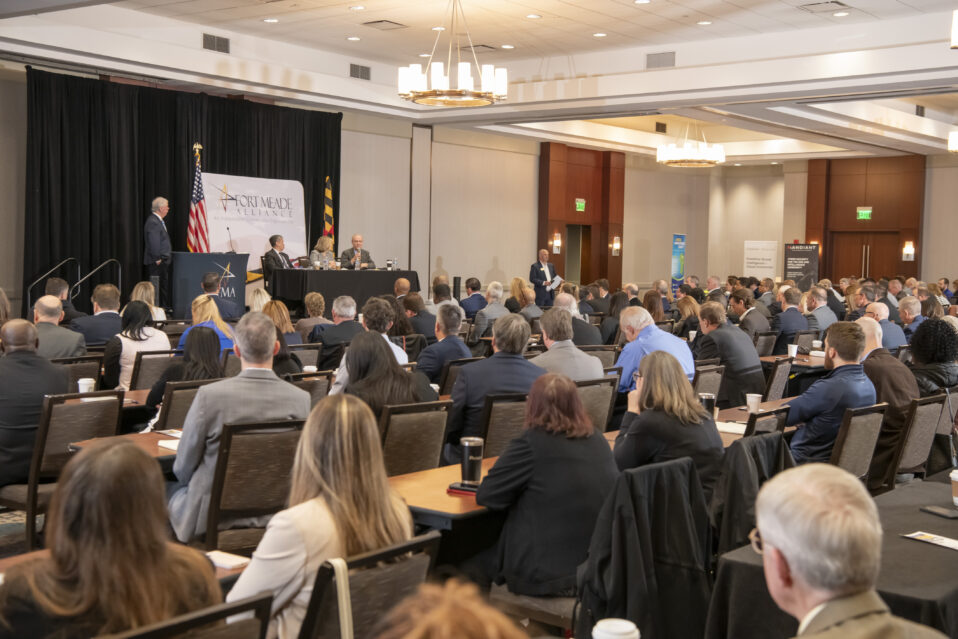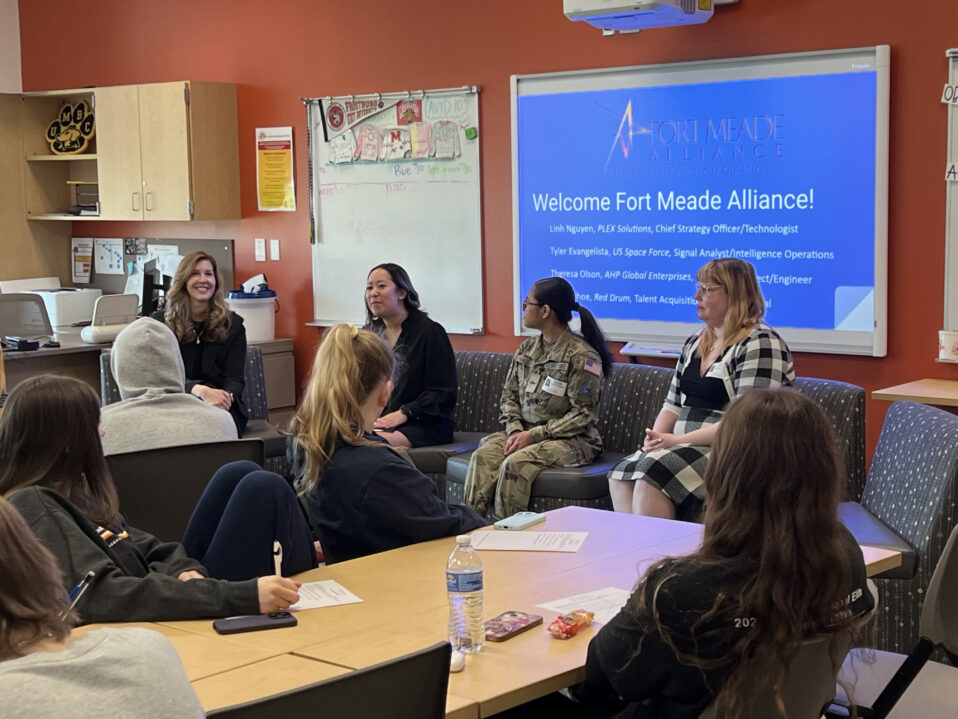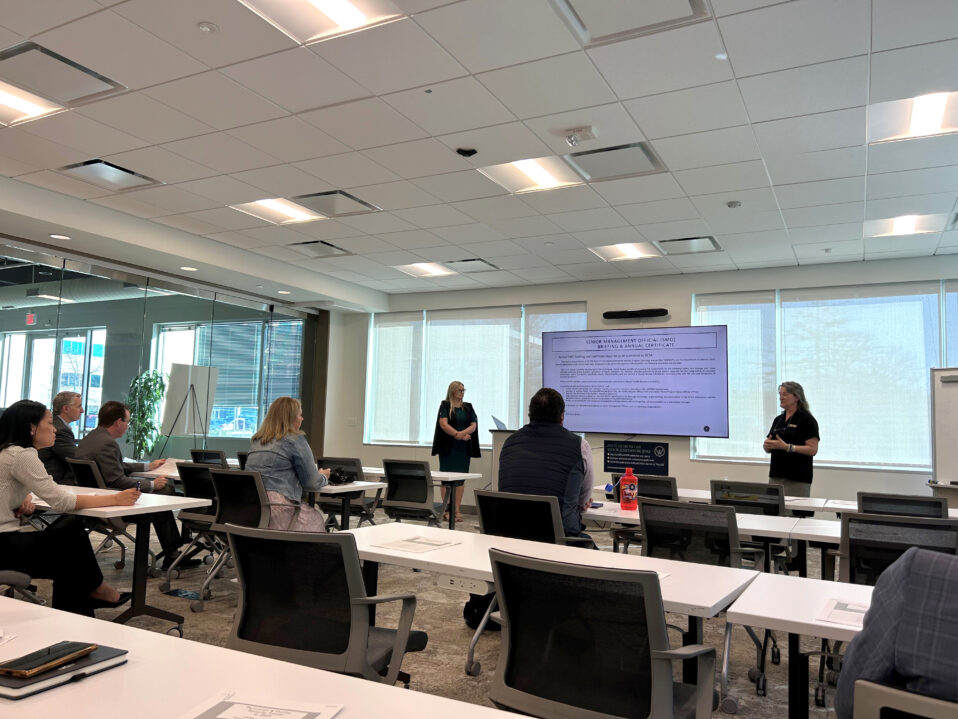 As the U.S. government raced to evacuate troops, citizens and allies from Afghanistan in August, Dan Van Wagenen received a surprising and urgent request.
As the U.S. government raced to evacuate troops, citizens and allies from Afghanistan in August, Dan Van Wagenen received a surprising and urgent request.
“About a week before the deadline for the U.S. withdrawal, I got a phone call from one of the government customer leads,” said Van Wagenen, Vice President of Cyber Operations at CENTERPOINT, an FMA Member. “The person said, ‘We are pulling all hands-on deck and stepping in to coordinate the evacuation of U.S. citizens and allies from Afghanistan. Can you help us?’”
From the peace and comfort of an office in the Mid-Atlantic, it’s easy to overlook the vital role that Fort Meade Region contractors and FMA members play in keeping warfighters and others safe when they face imminent harm. Yet many FMA member companies such as CENTERPOINT, CACI and Black Eagle Defense provide that vital, life-saving service every day. And some discover they can leverage their skills to provide vital aid in the midst of a crisis.
“This was work I never thought we would be doing,” Van Wagenen said.
CENTERPOINT had a team of cyber professionals working for the State Department, providing information assurance services. The State Department official on the phone wanted CENTERPOINT to pivot and begin triaging thousands of e-mails that were pouring in from U.S. citizens and allies in Afghanistan who were desperate to leave the country.
“That’s outside what we normally do so I asked the question, ‘Why are you coming to us?’” he said. “The answer that came back was, ‘You get stuff done,’ but they didn’t use the word ‘stuff.’”
Within an hour, CENTERPOINT reorganized its operations, established a skeleton crew to sustain cybersecurity at the State Department and reassigned 80 percent of its team to work on the Afghanistan evacuation. Starting with a backlog of more than 8600 unread e-mails and numerous others that were opened but unactioned, the team began reviewing the communications, routing emails to teams that could arrange extraction and steadily creating new processes to make the work more efficient.
“Some of the e-mails were heartbreaking: people who were trying to get out and didn’t know where to go or how to contact an embassy or consulate,” Van Wagenen said. “Overnight, this became a mission. We knew people’s lives were at stake. Eighty-two percent of my program are former military and many, like me, fought in Afghanistan and had seen direct combat with the Taliban.”
CENTERPOINT staff worked late into the nights and through the weekend.
“I could not have been more proud of my team and how they responded and gave their all during a time of national crisis to help our fellow countrymen and our allies. It is something I will be proud of until the day I die,” he said. “We may never know how many people we directly helped get out, but we hope we made a major difference.”
The State Department officials were so impressed by CENTERPOINT’s work that it issued individual certificates of appreciation to every team member, including the skeleton crew that kept the cybersecurity operations strong.
As the evacuation of Afghanistan began, professionals from FMA 5-Star Partner CACI on contract to an intel community customer also rapidly pivoted to a new, urgent mission. CACI software development teams provided critical insight about software tool capabilities to provide a national operations center with real-time geographical situational awareness.
“They also began taking calls from analysts at Kabul International Airport and other locations around Afghanistan and neighboring countries,” said Jim Weyant, Director or Technical Mission Systems at CACI. “The analysts were primarily involved in locating people and processing, evaluating and disseminating the signals intelligence that was coming into us to help protect our people at the airport and other facilities from attack from the ISIS and Taliban forces that were closing in… Our people provided subject matter expertise, support and technical guidance so those analysts who were executing extraordinary missions could make the best use of those software tools and capabilities.”
When the evacuation ended, CACI personnel found a way to extend the mission. Partnering with the International Rescue Committee in Baltimore on the “Welcome Home Project,” they raised thousands of dollars and all the housewares needed to outfit an apartment for a family of Afghan refugees.
For other companies, life-saving work happens in different forms.
While working for DARPA, Next Century Corporation (now part of CACI) used a database of improvised explosive device (IED) attacks in Afghanistan to develop a vital service for troops in the war zone.
“By processing and running analytics on the data, we could begin to predict where the next IED attacks would be,” said FMA Board Member John McBeth, formerly the President and CEO of Next Century and now an Executive Director at CACI. “It was used very successfully in theatre by going to the place where the next IED attack would occur and prevent the insurgents or terrorists from killing our troops.”
At a glance, the work of FMA Member Black Eagle Defense may sound routine. It supports security and resiliency for computer networks used in national security missions around the world. While working for another company during the Afghanistan war, however, CEO Andrew Gehman saw first-hand how vital a robust network was to the survival of American troops.
“I worked as a contractor in Afghanistan for 13 months,” Gehman said. “When I was over there, we were dealing with so many network connectivity issues and systems going down because they weren’t redundant or reliant. Back here, what we are doing now is improving network security and architecting systems so that they are always up, always ready, always providing a line of communication that is secure for the warfighter.”
Some cybersecurity work by Fort Meade Region companies delivers equally vital service to individuals facing harm in non-military situations.
“Next Century had a program that crawled the deep and dark web,” McBeth said “It would find human trafficking sites and alert state and local law enforcement to break up prostitution rings. There are some incredible stories of young ladies who were basically enslaved. Through this technology, they were rescued.”
Much of the life-saving work of contractors, however, can never be publicly acknowledged.
“I used to have a dream that our annual statement at Next Century would articulate how many lives we saved in the prior year,” McBeth said. “We found two problems with that: First, a lot of times we didn’t know how many lives we saved and second, sometimes we did know but we couldn’t say. What I realized later was what mattered was that the people doing the work knew and they did. They knew they were doing extremely important work and somedays they saved lives.”



